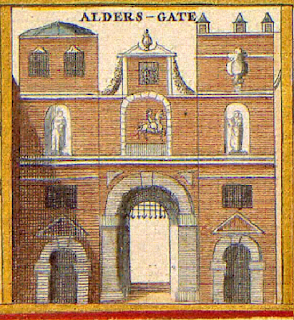He was a
31-year old, feeling grateful but also thinking of himself as a fragile and
vulnerable creature compared to the God upon whom he reflected. Many stories
contend for the specific circumstance that spurred Charles Wesley to call “Jesus,
(the) Lover of My Soul”. None of them have been verified, yet the five verses
he drafted have lingered for close to 300 years since their inception around
1738, about the time of an experience the composer evidently had at a place
called Aldersgate (see picture). Perhaps the words are a patchwork of events
that coalesced in Charles’ consciousness, or among other believers that inspired
him to record what a desperate person might say to Him who can rescue. Charles
evidently had already seen, or anticipated in his own future, various episodes
that prompted this ageless poetry.
Charles
Wesley was an Englishman who’d ventured across the ocean to America and then
back again, finding along this journey or in his native land, perhaps, the
roots of “Jesus, Lover…”. Charles and his brother John initiated the Methodist
movement along with others, including George Whitefield, while at Oxford in the
1720s. They later traveled to the American colony of Georgia in the mid-1730s,
though a rugged and brief tenure there led Charles to return to England in
1736. Perhaps it was the rough ocean voyage, or a brush with an angry crowd, or
a small bird that sought refuge in his room that nestled in his spirit and
caused Charles’ reflective thoughts. He had not actually made a deep commitment
to God until 1738, at a place in London known as Aldersgate, and that too may
have played a role in what he wrote about Jesus’ love for him. Was that period
a watershed for Charles? His conversion was apparently genuine, and he devoted
himself to ministry for the remainder of his life, so yes, Charles had indeed
found something that revolutionized his outlook. And, he wrote about it,
probably not just in “Jesus, Lover…”, but in various poems that illuminated his
spirit for the next several decades, giving Christendom some 6,000 hymns to
ponder and employ in worship. But with this hymn being in such proximity to
Aldersgate, it provides a window into the newfound sense of spiritual freedom that
Wesley was feeling. What were his thoughts, so close to that moment? He sensed
the imminent danger, and like someone still breathing heavy with alarm, sought help
from the most certain source. At such a moment, not just any haven is acceptable;
in fact, Charles saw no others (‘other refuge have I none’ – v. 2). Then imagine
being Charles, sinking, and being saved by God, the ultimate shelter (‘…dying,
and behold, I live’ – v.3). It must have been quite an experience, one perhaps
like Paul’s (on a conversion road to Damascus), to motivate Charles’ life over
the next half-century.
Verses
four and five could read like a microcosm or epilogue of Charles Wesley’s life
after Aldersgate. He spent the time up until 1788 in England, ministering and raising
a family with three children, two of which followed in his musical footsteps.
He certainly knew personally the grace of God that he wrote about in those two
verses, and must have felt fulfilled, in an earthly sense, because of the
choice he’d made. He wrote in a portion of verse 4 ‘…thou O Christ are all I
want…thou art full of truth and grace’. And, in verse 5: ‘Plenteous grace with
Thee is found…’. If you’re still young, think about what Charles might say to
you, if you are standing at a moment of choice. Think about where you might
want to be in 50 years. Or, if you’re further along, can you still change
something, before it’s too late? Read some of Charles’ words about Jesus’ love –
it’s never too late to grasp for Him!
See more information on the song
story in these sources: The Complete Book of Hymns – Inspiring
Stories About 600 Hymns and Praise Songs by William J. Petersen and Ardythe
Petersen, Tyndale House Publishers, 2006; Amazing Grace: 366 Inspiring Hymn
Stories for Daily Devotions by Kenneth W. Osbeck, Kregel Publications, 1990;
101 Hymn Stories, by Kenneth W. Osbeck, Kregel Publications, 1985; A
Treasury of Hymn Stories, by Amos R. Wells, Baker Book House, 1945; and Then
Sings My Soul, Robert J. Morgan, Thomas Nelson Publishers, 2003.
See the following
site for biography of the composer: https://en.wikipedia.org/wiki/Charles_Wesley
See this
site for all five of the original verses: http://www.hymntime.com/tch/htm/j/l/m/jlmysoul.htm


No comments:
Post a Comment